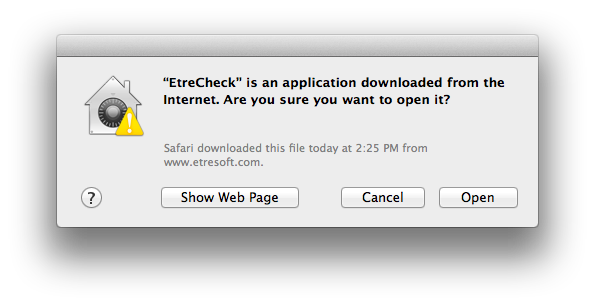John Galt Wrote:
Apple Support Communities contributor etresoft wrote a very useful app to quickly gather certain system information that may help point to a cause of this problem. Go to his website, download and run EtreCheck:
http://www.etresoft.com/etrecheck
Etrecheck will be in your Downloads folder. Open it from there. You may see the following dialog box:

I know you weren't in a conversation with me, but I've had the same issues and have tried everything you've advised (as well as others) I ran EtreCheckup, and here's my results...if you'd have time to let me know what is amiss, I'd truly appreciate it:
Hardware Information:
iMac (24-inch, Early 2009)
iMac - model: iMac9,1
1 2.66 GHz Intel Core 2 Duo CPU: 2 cores
4 GB RAM
Video Information:
NVIDIA GeForce 9400 - VRAM: 256 MB
Audio Plug-ins:
BluetoothAudioPlugIn: Version: 1.0
AirPlay: Version: 1.9
AppleAVBAudio: Version: 2.0.0
iSightAudio: Version: 7.7.3
System Software:
OS X 10.9 (13A603) - Uptime: 1 day 5:48:45
Disk Information:
ST2000DM001-9YN164 disk0 : (2 TB)
EFI (disk0s1) <not mounted>: 209.7 MB
Chad's HD (disk0s2) /: 2 TB (838.13 GB free)
Recovery HD (disk0s3) <not mounted>: 650 MB
OPTIARC DVD RW AD-5670S disk5 : (719.7 MB)
disk5s1 (disk5s1) <not mounted>: 30.3 MB
disk5s2 (disk5s2) <not mounted>: 47.9 MB
disk5s3 (disk5s3) <not mounted>: 28.8 MB
disk5s4 (disk5s4) <not mounted>: 46.7 MB
disk5s5 (disk5s5) <not mounted>: 53.5 MB
disk5s6 (disk5s6) <not mounted>: 21.9 MB
disk5s7 (disk5s7) <not mounted>: 66.1 MB
disk5s8 (disk5s8) <not mounted>: 39.1 MB
disk5s9 (disk5s9) <not mounted>: 43 MB
disk5s10 (disk5s10) <not mounted>: 45.3 MB
disk5s11 (disk5s11) <not mounted>: 47.7 MB
disk5s12 (disk5s12) <not mounted>: 49.9 MB
disk5s13 (disk5s13) <not mounted>: 45 MB
disk5s14 (disk5s14) <not mounted>: 25 MB
disk5s15 (disk5s15) <not mounted>: 65.7 MB
disk5s16 (disk5s16) <not mounted>: 63.8 MB
USB Information:
Apple Inc. Built-in iSight
Seagate FreeAgentDesktop 500.11 GB
disk3s1 (disk3s1) <not mounted>: 32 KB
PeripheralHD (disk3s3) /Volumes/PeripheralHD: 499.97 GB (110.81 GB free)
Seagate FreeAgent Go 500.11 GB
disk2s1 (disk2s1) <not mounted>: 32 KB
NYC Apple (disk2s3) /Volumes/NYC Apple: 499.97 GB (43.45 GB free)
Western Digital My Passport 0746 1 TB
disk1s1 (disk1s1) <not mounted>: 32 KB
disk1s2 (disk1s2) <not mounted>: 29 KB
disk1s3 (disk1s3) <not mounted>: 29 KB
disk1s4 (disk1s4) <not mounted>: 29 KB
disk1s5 (disk1s5) <not mounted>: 29 KB
disk1s6 (disk1s6) <not mounted>: 262 KB
disk1s7 (disk1s7) <not mounted>: 262 KB
disk1s8 (disk1s8) <not mounted>: 262 KB
Chad's WD Drive (disk1s10) /Volumes/Chad's WD Drive : 1 TB (182.47 GB free)
Apple Computer, Inc. IR Receiver
Apple Inc. BRCM2046 Hub
Apple Inc. Bluetooth USB Host Controller
FireWire Information:
Thunderbolt Information:
Kernel Extensions:
Problem System Launch Daemons:
Problem System Launch Agents:
Launch Daemons:
[loaded] com.adobe.fpsaud.plist
[loaded] com.freemacsoft.appcleanerdaemon.plist
[loaded] org.macosforge.xquartz.privileged_startx.plist
Launch Agents:
[loaded] com.divx.dms.agent.plist
[loaded] com.divx.update.agent.plist
[loaded] org.macosforge.xquartz.startx.plist
User Launch Agents:
User Login Items:
iTunesHelper
3rd Party Preference Panes:
Flash Player
Flip4Mac WMV
Perian
Internet Plug-ins:
DivX Web Player.plugin
Flash Player.plugin
FlashPlayer-10.6.plugin
OVSHelper.plugin
User Internet Plug-ins:
Bad Fonts:
None
Time Machine:
Time Machine not configured!
Top Processes by CPU:
2% WindowServer
1% fontd
1% EtreCheck
0% SystemUIServer
0% aosnotifyd
Top Processes by Memory:
262 MB iTunes
143 MB Finder
143 MB com.apple.WebKit.WebContent
139 MB softwareupdated
102 MB WindowServer
78 MB mds_stores
66 MB Safari
57 MB Flip Player
49 MB com.apple.WebKit.Networking
41 MB com.apple.IconServicesAgent
Virtual Memory Statistics:
774 MB Free RAM
1.61 GB Active RAM
594 MB Inactive RAM
533 MB Wired RAM
4.24 GB Page-ins
24 MB Page-outs
Thanks for your help,
C
Message was edited by: James Williams2